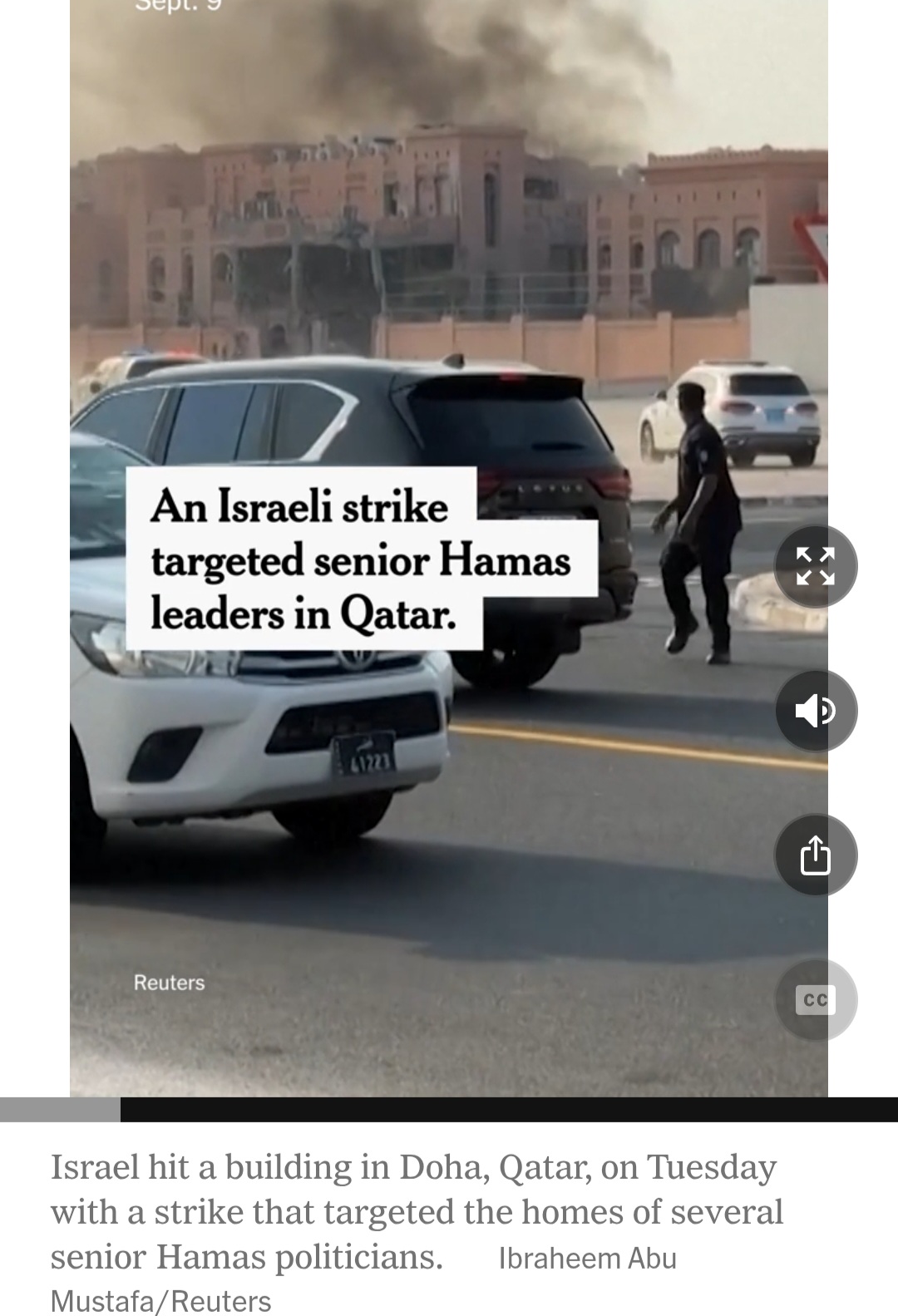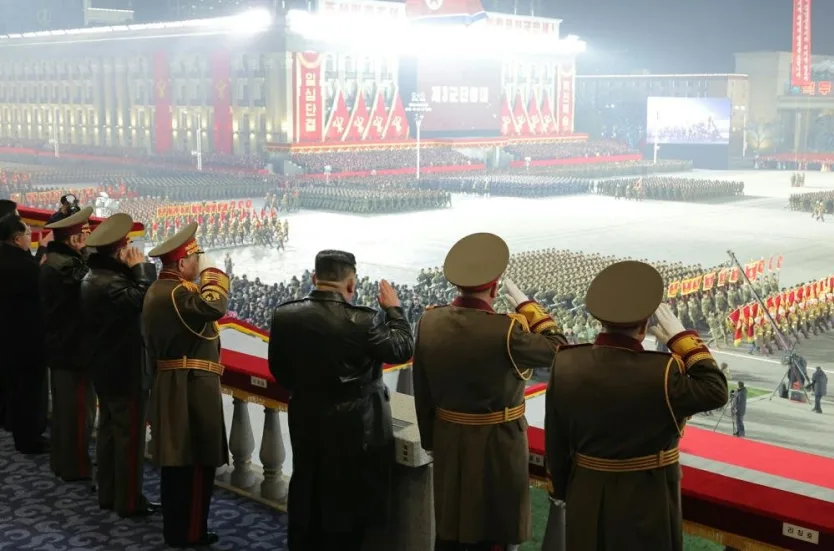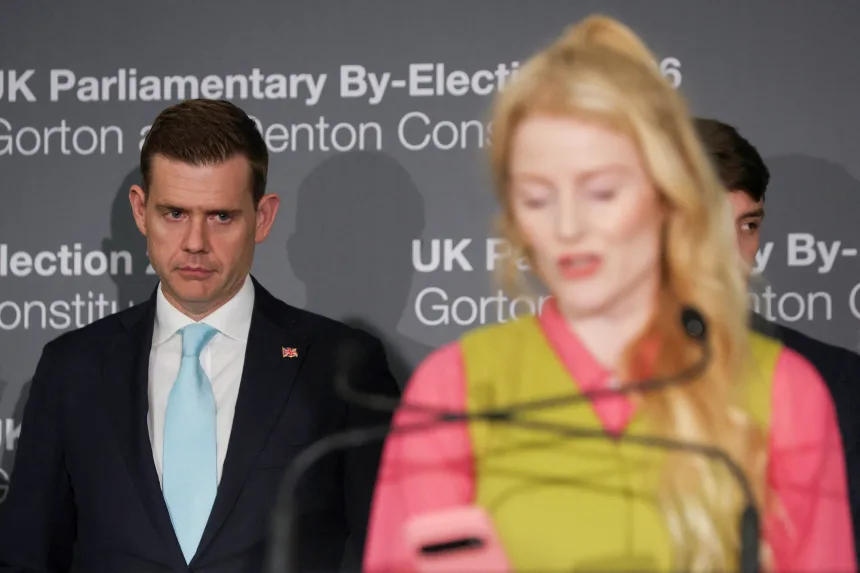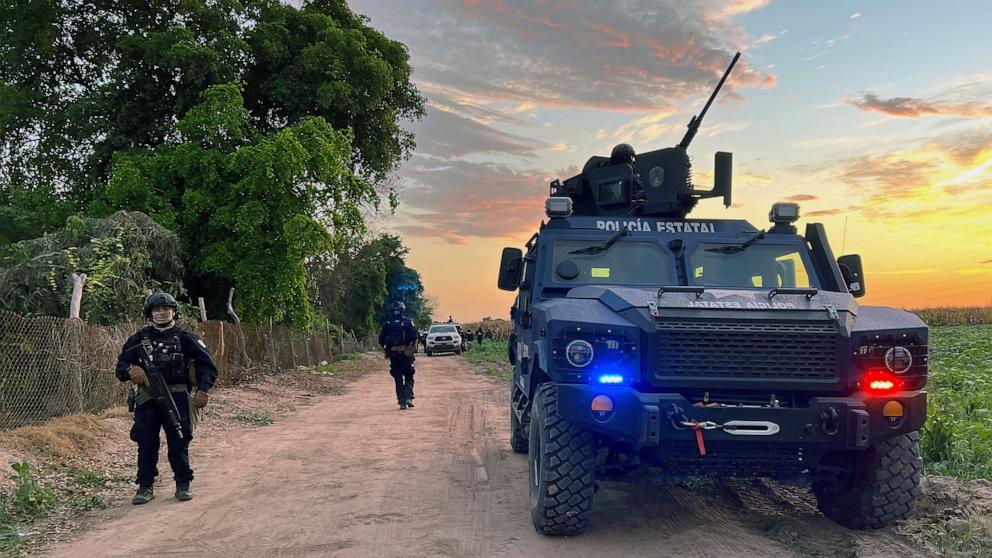Now Reading: Israel Attempts to Kill Hamas Leadership in Airstrike on Qatar, a Gaza War Mediator
-
01
Israel Attempts to Kill Hamas Leadership in Airstrike on Qatar, a Gaza War Mediator
Israel Attempts to Kill Hamas Leadership in Airstrike on Qatar, a Gaza War Mediator

By Adam RasgonVivian Nereim and Ronen Bergman, The New York Times
The Gulf nation of Qatar has been trying to negotiate a cease-fire in the conflict. The attack threatened to destabilize those peace efforts.
Israel attempted to kill senior members of Hamas in an airstrike on Tuesday in Qatar, a sharp escalation that brought the Mideast war to a close U.S. ally and a primary mediator in trying to end the conflict in Gaza.
The Israeli strike on a Hamas meeting, where the group said its officials were discussing a cease-fire proposal backed by President Trump, threatened to undermine negotiations over the Gaza war. The direct attack on Qatar’s territory also risked antagonizing the Qatari government and destabilizing its diplomatic efforts in the war, particularly because the country’s political and economic stability hinges on its reputation as a haven for business and tourism in a volatile region.
The afternoon attack by Israel’s air force hit an area of the capital, Doha, that is near schools and embassies, sending black smoke billowing into the air.
Hamas said the Israeli strike had failed to kill senior officials in the group, without specifying whether they had sustained injuries. In a statement, the group confirmed that the son of Khalil al-Hayya, Hamas’s chief negotiator; his office manager; and three other people affiliated with Hamas had been killed in the attack.
But the strike killed a member of Qatar’s internal security forces and injured a number of civilians, the country’s Interior Ministry said.
Qatar will continue its role as a mediator in the war, Sheikh Mohammed bin Abdulrahman, the country’s prime minister, said on Tuesday. But the Persian Gulf state has also formed a legal team to determine how to respond to Israel’s attack, he said, denouncing Israel’s prime minister, Benjamin Netanyahu, by name.
“We have reached a decisive moment where there must be a response from the entire region to such barbaric actions,” Sheikh Mohammed said.
President Trump gave what appeared to be conflicting accounts on Tuesday about when his administration knew about the Israeli strike. First, he said on social media that the U.S. military had informed his administration that “Israel was attacking Hamas” in the Qatari capital. “This was a decision made by Prime Minister Netanyahu,” he said. “It was not a decision made by me.”
He said he had “immediately” directed his Middle East envoy, Steve Witkoff, to inform the Qataris of the impending attack, but that Mr. Witkoff had done so “unfortunately, too late” to stop the strike. Mr. Trump also said he had also spoken to Mr. Netanyahu, along with the emir and prime minister of Qatar, after the attack.
“I view Qatar as a strong Ally and friend of the U.S., and feel very badly about the location of the attack” Mr. Trump wrote. “I want ALL of the Hostages, and bodies of the dead, released, and this War to END, NOW!”
Later, he also told reporters that he hadn’t been informed about the Israeli strike ahead of time, according to a pool report.
The Qatari prime minister said that the United States had not warned Qatar about the attack until 10 minutes after it happened. He accused the Israeli government of trying “to sabotage every attempt to create opportunities for peace.”
“Does the international community need more proof?” he asked. “History will record this incident.”
A Qatari Foreign Ministry spokesman, Majed al-Ansari, said the attack had targeted a residential headquarters where a number of senior Hamas politicians lived.
Israeli officials have vowed to kill Hamas leaders who were involved in the planning of the Oct. 7, 2023, attack on southern Israel that ignited the war in Gaza.
A week ago, Lt. Gen. Eyal Zamir, the Israeli military’s chief of the staff, suggested that Israel was focused on attacking not only Hamas in Gaza, but also its officials in the broader region.
“We are operating across the entire Middle East,” he told reserve soldiers. “Hamas will have no place to hide from us. Wherever we locate them, whether they are senior or junior figures — we strike them all, all the time.”
Hamas representatives met on Monday with the Qatari prime minister to discuss Mr. Trump’s proposal for a cease-fire in Gaza, according to a Qatari official, who spoke on the condition of anonymity to discuss a sensitive matter. The group had planned to convene on Tuesday to further talk about the proposal, the official said.
In its statement, Hamas said officials were discussing Mr. Trump’s proposal when they came under attack. “The cowardly assassination attempt will not change our clear positions and demands,” Hamas said.
Hamas has called for an end to the war in Gaza, the complete withdrawal of Israeli troops, the unfettered entry of aid, and the exchange of Israeli hostages for Palestinian prisoners. Mr. Netanyahu has said Israel was willing to end the war but only if Hamas releases all the remaining hostages, disarms and Gaza is demilitarized — conditions that Hamas has publicly opposed.
In May, Israel Katz, Israel’s defense minister, specifically threatened Mr. al-Hayya, the chief negotiator, who is often in Qatar.
Israel appeared to try to distance the United States from the attack by saying it was a “wholly independent Israeli operation.” Thousands of American soldiers are stationed at Al Udeid Air Base in Qatar. And the country agreed to host an office for Hamas at the request of the United States, Qatari officials have said in the past.
“Israel initiated it, Israel conducted and Israel takes full responsibility,” Mr. Netanyahu’s office said in a statement.
The building hit by the airstrike had been identified by Israel as a site where Hamas leadership often meets, according to two Israel officials with knowledge of the matter, who spoke on the condition of anonymity to discuss sensitive matters. The site, they said, had been code-named “Judgment Day.”
Qatar was thought to be neutral ground, in part because it maintains contacts with the Israeli government. Senior Israeli government officials have traveled to the emirate many times to talk to Qatari leaders about securing the release of hostages in Gaza.
“The whole structure we’ve been dealing with since the Oct. 7 attacks — the whole diplomatic structure — has just collapsed,” said Ghaith al-Omari, a senior fellow at the Washington Institute for Near East Policy, a research institution.
The willingness to attack Qatar’s capital could also undermine Israel’s longstanding efforts to build ties with Gulf Arab nations that it views as potential allies against Iran. That diplomatic undertaking had already been strained by Israel’s bombardment and invasion of Gaza.
“This reinforces the growing sense in the region that Israel is becoming a destabilizing actor,” Mr. al-Omari said.
The strike made Qatar — and other Gulf countries, by proxy — appear vulnerable to external attacks, despite the fact that the emirate has invested billions of dollars in American defense equipment and hosts a major U.S. military presence. The Al Udeid Air Base in Qatar was attacked by Iran in June, though the strike was largely thwarted by American defense systems.
“Troubled time for the Gulf, but the biggest loser is the U.S.,” said Bader Al-Saif, an assistant professor of history at Kuwait University. Despite being Israel’s most important foreign ally and military supplier, the United States appears to be either unwilling or unable to rein in Israel’s offensives across the region, and that is undermining its credibility as a security guarantor in the Gulf, he said.
The United Arab Emirates, which led a push for Arab states to establish diplomatic relations with Israel in 2020, swiftly condemned the strike.
The Emirati foreign minister, Sheikh Abdullah bin Zayed, issued a statement calling Israel’s strike “an irresponsible escalation that threatens regional and international security.”
António Guterres, the U.N. secretary general, condemned what he called a “flagrant violation of the sovereignty and territorial integrity of Qatar.”
“All parties must work toward achieving a permanent cease-fire not destroying it,” he said.




